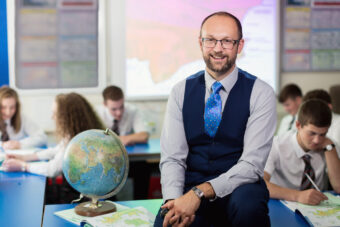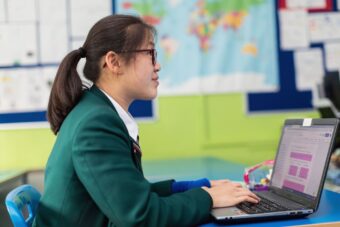
Here in the Geography Department, we are giving children the skills and the knowledge to find their place in the world. Harnessing our technology and field work techniques to make sure they are well equipped to go out and do the best they can.

P7
The transition of primary pupils benefits greatly from our ability to offer a range of topics as a discrete subject. This invaluable head start allows us to sow the seeds of skills and knowledge that will form the bedrock of future studies. Topics include “Know My World” – a map based unit that covers both atlas skills and Ordnance Survey activities, “Hazardous Hurricanes” – where pupils learn about the truly destructive nature of our natural world and how we can mitigate these disasters and “Mission Explore” – a fieldwork based unit set in the local context, where individuals can plan and partake in a series of investigative lessons designed to enhance the critical awareness of their surroundings.
S1 and S2
The Geography curriculum in S1 and S2 is designed to expose pupils to the full breadth of this diverse and wide-ranging subject.
In S1, pupils commence with a focus on physical geography, studying the topic of “Weather”. They continue to develop their geographical skills by completing an enquiry on the microclimate around the school. This involves the collection of primary data using weather instruments, prior to processing and analysing their results.
Next, an in-depth exploration of “Kenya” as a developing world case study provides all pupils with their first taste of human geography. By examining rural and urban lives the complex nature of this beautiful country is revealed, showing the variation in the standard of living within its borders.
The final S1 topic is “World Biomes”. By combining themes from both physical and human geography this global issue focuses on the study of Tropical Rainforests and the Arctic Tundra. In addition to the natural processes taking place in these environments, time is spent examining the impact of human activities and the unit concludes with a personal research project on Hot Deserts.
S2 Geography starts with “Japan” a developed world case study that contrasts well with the knowledge gained in S1. Pupils discover that against all odds, Japan has overcome its geographical and historical difficulties to emerge as one of the most economically and technologically successful countries in the world. The unit covers population distribution, traditional and modern lifestyles, industrial success and international trade; and it concludes with the study of a major environmental disaster.
The second unit of S2 concentrates on the global issue of “Earth Forces” and explores the inner workings of our unique planet. Having covered the theory, pupils will engage in a number of practical activities before they examine the impact of Earthquakes and Volcanoes through the investigation of various case studies including the eruption of Eyjafjallajökull in 2010 and the Japanese Tsunami of 2011.
The geographical journey for junior pupils here at Wellington concludes with the physical study of “Rivers” as they travel from source to mouth. Key processes and skills are embedded throughout the unit to complete the coverage of fundamental geographical knowledge provided to all, prior to their optional continuation of the subject in subsequent years.
National 5
Maximising the excellent opportunity provided by the school to cover the National 5 course over two years, we are able to investigate every unit to its full breadth and depth, challenging and supporting individuals along the way.
In S3, pupils study Physical Environments, encompassing our “Coastal Landscape” and “Weather”. The former is strengthened by the understanding of physical processes covered by work at the end of S2, whilst the latter builds upon the foundations of S1. Human Environments topics include “Urban Change” in Rio de Janeiro and “Population & Development”, both of which dovetail well with topics studied in S1 and S2. The final theme of Global Issues is established through investigations of “Climate Change” and “Health”. These contemporary matters highlight the subject’s unique place spanning the bridge between social and natural sciences.
Having completed their S3 exam, pupils transition to S4 seamlessly and progress onto the final Physical unit of “Glaciation”. This work provides an excellent opportunity for a Field Trip to Loch Lomond in order to witness first hand both the breathtaking landscape created millions of years ago and the attempts of organisations to manage the increasingly popular tourist destinations within the National Park. Time is spent collecting data for use in the National 5 Assignment – an assessment performed under exam conditions which is externally marked by the SQA and contributes 20% to the final grade. The course concludes with a study of the changes taking place in “Glasgow” and an examination of “Rural” geography as population growth and environmental decline call into question our ability to feed ourselves, both in the UK and the wider world.
Higher
Geography at Higher is a challenging and exciting course. Due to the nature of the content and skills covered, a qualification at this level is highly advantageous for progression to further education, university and the world of work – with employers frequently seeking the attributes gained from such a flexible subject.
Core physical topics include Lithosphere (coasts and glaciation), Hydrosphere (rivers), Biosphere (soils) and Atmosphere (air and oceans). Human units cover Urban Change (housing and transport issues in Glasgow and Lagos), Population (change and migration) and Rural (conflicts and degradation). Pupils also study two Environmental Interactions: River Basin Management and Development and Health.
In keeping with the National 5 course there is a formal Assignment Assessment, accounting for approximately 27% of the course award. Through fieldwork opportunities provided by the department and other activities embedded in the course, pupils develop a number of key skills including: interpretation and analysis, field sketching, cross sections/transects, research skills, gathering, processing, evaluating and synthesizing.
Advanced Higher
The purpose of the Advanced Higher course is to consolidate pupils’ understanding of the changing world and its human and physical processes. Opportunities for practical activities including fieldwork will be essential parts of this course; this allows pupils to interact with and better understand their environment.
With growing awareness of the impact of human activity on the environment and scarce resources, the study of Geography fosters positive lifelong attitudes of environmental stewardship, sustainability and global citizenship. At Advanced Higher, S6 pupils will gain the knowledge and skills which will enable them to effectively engage with challenging issues in their local communities and wider society. Through the course of the year, pupils will:
- Understand the ways in which people and the environment interact in response to physical and human processes
- Study spatial relationships to develop a balanced and critical understanding of the changing world
- Acquire a geographical perspective on environmental and social issues and their significance
- Further develop skills of independent research, fieldwork, analysis, synthesis, evaluation and presentation further develop skills and techniques to collect, extract, analyse and interpret information to explain geographical phenomena using appropriate terminology
- Further develop expertise in the use of maps, diagrams, statistical techniques and written accounts
The course is assessed via two components; a pupil led folio of work which makes up 67% of the course grade and an examination for the remaining 33%.
Future Study & Careers
Geography can be successfully combined with a range of other subjects; effective subject combinations could lead to the following areas of employment and further study: Geology, Meteorology, Geophysics, Surveying, Journalism, Banking, Planning, Publishing, Teaching, Architecture, Cartography, Archiving, Environmental Health, Ecological Science, Coastal Management, Forestry, Land Policy, Topographic Science, Navigation, Quarry Engineering, Resource Management, Tourism Management and Zoology.
Geography Degrees include fieldwork (at home or abroad) and further development of Geographical Techniques, Statistical testing and ICT skills. Many courses also include an industrial placement for the third year of a four year course.
Geography can be successfully combined with a range of other subjects; effective subject combinations could lead to the following areas of employment and further study: Geology, Meteorology, Geophysics, Surveying, Journalism, Banking, Tourism, Planning, Publishing, Teaching, Architecture, Cartography, Archiving, Environmental Health, Ecological Science, Coastal Management, Forestry, Land Policy, Topographic Science, Navigation, Quarry Engineering, Resource Management, Tourism Management and Zoology.
Geography Degrees include fieldwork (at home or abroad) and further development of Geographical Techniques, Statistical testing and ICT skills. Many courses also include an industrial placement for the third year of a four year course.